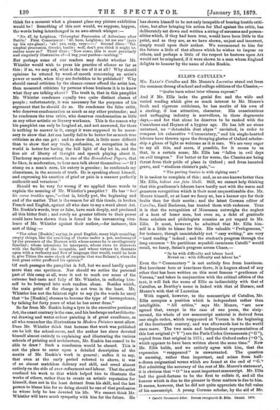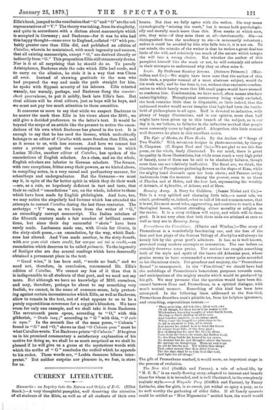ELLIS'S CATULLUS.* Mn. Ems's Catullus and Mr. Munro's Lucretius stand
out from the common throng of school and college editions of the Classics,— " Quales lenta solent inter viburna enpressi."
And if Mr. Ellis lacks the genial fire and the wide and varied reading which give so much interest to Mr. Munro's fresh and vigorous criticisms, he has merits of his own of a sterling, if less attractive, character. His conscientious and unflagging industry is marvellous, in these degenerate days,—and for that alone he deserves to be ranked with the Casaubons and Heynes of a bygone age. He has left no stone unturned, no "detestable dust abyss" unvisited, in order to compass his exhaustive " Commentary," and his single-hearted labours have thrown upon the decaying glories of Oxford scholar- ship a gleam of light as welcome as it is rare. We are very eager to say all this, and more, if possible, for it seems to us that, in a certain sense, Mr. Ellis has "fallen in evil days on evil tongues." For better or for worse, the Classics are being thrust from their pride of place in Oxford ; and from haunted grave, and "studious cloister's pale,"—
" The parting Genius is with sighing sent."
It is useless to complain of this ; and, as no one knows better than Mr. Ellis, habent sea fate libelli. Still, we cannot help thinking that this gentleman's labours have hardly met with the warm and generous recognition which is their most unquestionable due. Mr. Munro himself, or at least we fancy so, has a keener eye for their faults than for their merits ; and the latest German editor of Catullus, Emil Baehrens, has treated them with rudeness. True it is that the recognition of Mommsen outweighs the neglect of a host of lesser men, but even so, a debt of gratitude from scholars and philologists remains as yet unpaid to Mr. Ellis. It must, however, be admitted that Mr. Ellis him- self is a little to blame for this. His valuable "Prolegomena," for instance, though unmistakably not "easy writing," are very "hard reading" indeed ; and the student's progress through the long excursus "De partitione mquabili carminnm Catulli" would recall, we fancy, Satan's progress across Chaos,— " So he with difficulty and labour hard Moved on : with difficulty and labour he."
Even the " Commentary " is not entirely free from heaviness. But heaviness here or heaviness there, it is leagues ahead of any other that has been written on this most famous "gentleman of Verona," and taken in conjunction with the critical edition of the text, it will link the name of Ellis as indissolubly with that of Catullus, as Bentley's name is linked with that of Horace, and Munro's with that of Lucretius.
With regard, however, to the manuscripts of Catullus, Mr. Ellis occupies a position which is independent rather than intelligible. "All critics," says Mr. Munro, "are now agreed that, except in the case of one poem, the sixty- second, the whole of our manuscript material is derived from one single codex, which reappeared at Verona in the beginning of the fourteenth century, and was afterwards lost to the world once more. The two main and independent representatives of this lost original ("V ") are the Paris Codex Germanensis (" G"), copied from that original in 1375; and the Oxford codex (" 0"), which appears to have been written about the same time." Now Mr. Ellis holds, and we entirely agree with him, that the expression " reappeared " is unwarranted. The question is amusing, rather than important, and arises from half- a-dozen enigmatical verses which are found at the end of " But admitting the accuracy of the rest of Mr. Munro's statement, it is obvious that " 0 " is a most important manuscript. Mr. Ellis had the good-fortune to be the first to collate it, and all the honour which is due to the pioneer in these matters is due to him. It seems, however, that he did not quite appreciate the full value of his manuscript. A young German scholar, by the aid of Mr.
• Catulli Verandah Liber. Rolm recognovit E. Ellis. Ozottii. 1578. Ellis's book, jumped to the conclusion that" G"and "0 "are the sole representatives of "V." The theory was taking, from its simplicity, and quite in accordance with a dictum about manuscripts which is accepted in Germany ; and Baehrens—for it was he who had this happy thought—came over to England, collated "0" with pro- bably greater care than Ellie did, and published an edition of Catullus, wherein he maintained, with much ingenuity and success, that all existing manuscripts, except "0," are derived directly or indirectly from "G." This proposition Ellis still strenuously denies. Nor is it at all surprising that be should do so. To parody Aristophanes, Baehrens stole the cake which Ellis bad made, and to carry on the allusion, he stole it in a way that was Cleon all over. Instead of showing gratitude to the man who had prepared the way and made the path straight for him, he spoke with flippant severity of his labours. Ellis retorted warmly, too warmly, perhaps, and Baehrens flung the counter- check quarrelsome, to put it mildly, back into Ellis's face. But rival editors will be rival editors, just as boys will be boys, and se must not pay too much attention to these amenities.
It concerns us more to say that while we suspect Baehrens to be nearer the mark than Ellis in his views about the MSS., we still give a decided preference to the latter's text. It would be beyond the scope of an article like the present to notice the emen- dations of his own which Baehrens has placed in the text. It is enough to say that he has used the licence, which undoubtedly belongs to an editor of Catullus with more freedom than Ellis, and as it seems to us, with less success. And here we cannot but enter a protest against the contemptuous terms in which Lucian Muller, another editor of Catullus, has spoken of the emendations of English scholars. As a dam, and on the whole, English scholars are inferior to German scholars. The former, with rare exceptions, fritter away their powers, as we hinted above, in compiling notes, in a very casual and perfunctory manner, for schoolboys and undergraduates. But the Germans—we must say it, in spite of the far better spirit in which they do their work —are, as a rule, so hopelessly deficient in tact and taste, that their so-called " emendations " are, on the whole, inferior to those -which have been made by English philologists. And here, too, we may notice the singularly bad fortune which has attended the attempts to correct Catullus during the last three centuries. The archetype " V " was, as we learn from the writer of "U," an exceedingly corrupt manuscript. The Italian scholars of the fifteenth century made a fair number of brilliant correc- tions, but since their day successful " shots " have been rarely made. Lachmann made one, with Graia for Gratia, in the sixty-sixth poem,—an emendation, by the way, which Baeh- con has altered. And Voss made another, in the sixty-fourth, with sese quae visit visere credit, for seseque sui tui se credit,—an emendation which deserves to be called palmaris. To the ingenuity of Scaliger also are due several readings which have deservedly obtained a permanent place in the text.
"Good wine," it has been said, "needs no bush," and we need not, therefore, in conclusion, recommend Mr. Ellis's edition of Catullus. We cannot say less of it than that it is indispensable to all students of that poet, and we need not say more. But although we have no knowledge of MSS. ourselves, and may, therefore, perhaps be about to say something very foolish, we cannot, in the name of common-sense, help protest- ing against certain inconsistencies which Ellis, as well as Baehrens, allow to remain in the text, out of what appears to us to be a purely superstitious reverence for a copyist's blunders. We have room for only one example, and we shall take it from Baehrens. The seventeenth poem opens, according to "0," with this gibberish, " Oculo inaq ;" according to " G " with this, "0 cub in ague." In the seventh line of the same poem, " Colonia " found in "G" and "0," shows us that "0 Colonia quae" must be what Catullus wrote. Yet Baehrens prints "0 Culonia." If he gives us in his promised commentary a satisfactory explanation of his motive for doing so, we shall be as much surprised as we shall be pleased if he will give us a guess at the mysterious words with which the scribe of "U" concludes the codicil which he appends -to his codex. These words are, " Lesbia damnose bibens inter- pretat." But neither surprise nor pleasure is, we fear, in store for us.



































 Previous page
Previous page